I love when people dig up new dirt on my favorite things from 30-ish years ago, in this case a playable prototype of a never-developed “talkie” version of LucasArt’s The Secret of Monkey Island 2: LeChuck’s Revenge. The folks at the venerable MixNMojo site have a good writeup, including a detailed archeology on the differences and new sound resources discovered, along with information and images of LucasArt’s internal debugging tool called Windex (which ran on a second monitor in Hercules monochrome graphics mode!). Neat.
Tag: lucasarts
-
Monkey Island 2 — Talkie Prototype!
-
Douglas Crockford Atari Burgers and Maniac Mansion
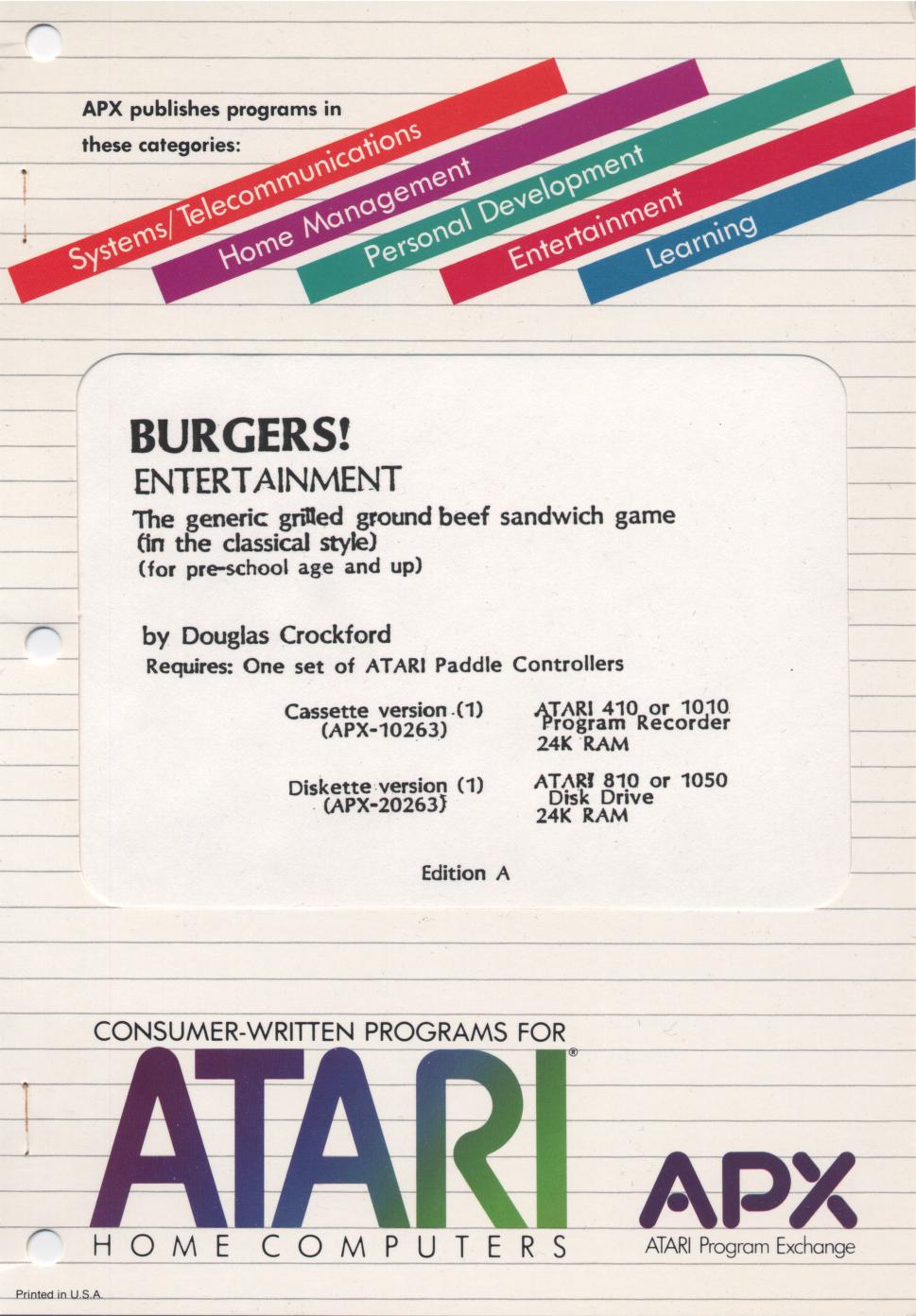
I recently went on a dig through the Archive.org Atari 8-bit Manuals archive, clicked on a fairly random manual for a not-exactly-popular shoot-em-up (Burgers!), and was surprised to find that the game was written by Douglas Crockford, well-known JavaScript developer and creator of the JSON data format standard.
This also reminded me that I’d also seen his name on early Lucasfilm Game products — he was the one who had to bowdlerize the NES port of Maniac Mansion for the NES! Go read his Expurgation of Maniac Mansion post, it’s worth it if you’re a fan of that era of adventure game.
Anyhow, I kind of envy his career path.
-
Brian Moriarty Listen

Game designer Brian Moriarty delivered quite a talk at the 1997 Game Developers Conference, touching on everything from interaction design, emergent play, community-created art, creativity, self expression, and even an unexpected but interesting tangent about 101 Dalmatians. In hindsight, many of subjects he talks about would become evident over the next decade, from the Sims to Etsy to Minecraft to social networking. From Listen! The Potential of Shared Hallucinations:
Before we can learn, before we can grow, we have to be prepared to listen.
What does it mean, to listen?
The word is commonly understood to mean “attentive hearing.”
It has its etymological origin in the archaic verb, list.
“List!” they used to say. “Ssh! List! The wild boar is outside!”
But the verb “list” also means to tilt something to one side.
When a sea vessel leans to starboard or port, it is said to be listing.
So how did the word “list” turn into the verb “listen?”
Because when we try to hear something, we sometimes cock our heads in the direction of the sound.
So to listen means more than to hear attentively.
The word also implies a change of inclination.
A new slant.
To listen is to put ourselves into a receptive attitude.
A position to be re-aligned.
Also worth reading (the talk is also available for watching as a video in the GDC Vault) if you fondly remember the days of Hypercard, MUDs, and when text adventures reigned supreme on AOL, or if you like crazy 1990s Photoshop anaglyphs…
-
The Secret Font of Monkey Island

A fan-made port of the pixel font built into the adventure game classics The Secret of Monkey Island and Monkey Island 2: LeChuck’s Revenge. As a bonus, a separate version is available that is properly kerned and hinted. (double bonus: opening the .ttf file in Font Book reveals that the demonstration string for the font reads “You fight like a dairy farmer!”)
A post combining Lucasfilm Games and typography? Immediate reblog!
1990s, dos, font, fonts, games, lucasarts, lucasfilm, monkey island, nostalgia, type, typography, video games -
Maniac Tentacle Mindbenders: How ScummVM’s unpaid coders kept adventure gaming alive
Nice write-up by Ars Technica on the ScummVM project’s history and developers. Hard to believe it’s been around for over 10 years already! (also, I hadn’t heard that they had a brief-lived controversial build that supported Eric Chahi’s Another World, one of the best games of all time…)
-
Lucasarts Adventurer
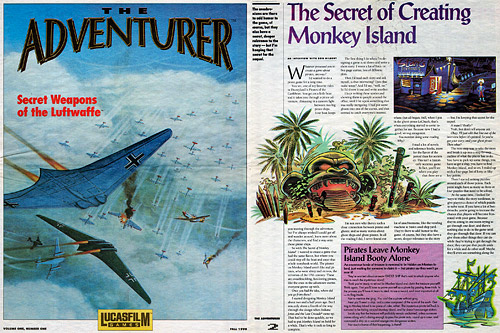
OMG OMG, some kind soul is posting good-quality, full-page scans of all of the old LucasFilm Games / LucasArts Adventurer magazines! Created at the company’s artistic height, these gems were half retail catalog, half inside scoop trivia treasure trove, decked out with never-to-be-seen-again Steve Purcell art (including single-page Sam & Max comics parodying the major Lucas game release featured that issue). They now sell for an arm and a leg on eBay.
I used to have every one of these, but they all vanished to whatever corner of the landfill my triangular Day of the Tentacle box and Dial-A-Pirate wheels ended up in…
(Via MixNMojo)
-
Lucasfilm Games Tv Humor Video
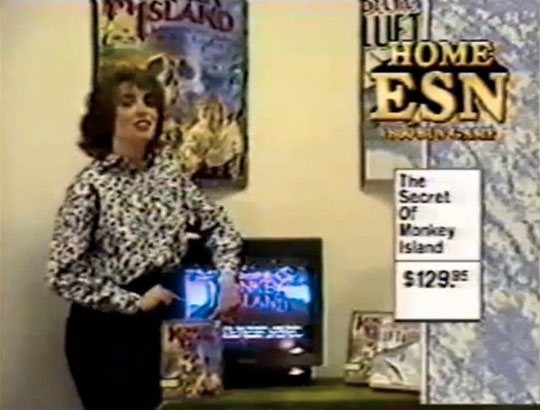
If you’re a fan of the old Lucasfilm Games (and the kind of video game nerd that likes this sort of weird find…), don’t let your week go by without watching this internal Lucasfilm Games parody video unearthed by Mix n’ Mojo. Shots of Skywalker Ranch, Ron Gilbert, Larry Holland, jokes riffing off of the “Bo Knows” and “Spielvergnügen” (erm, Fahrvergnügen) ads, and even a song sung on the Ranch’s porch about their adventure games. It doesn’t get much more 1990 then this, folks!
(Bonus: watch for the boxed copy of King’s Quest V on the desk at around 8 minutes in — how’d that get in there??)
-
Maniac Mansion Disassembled
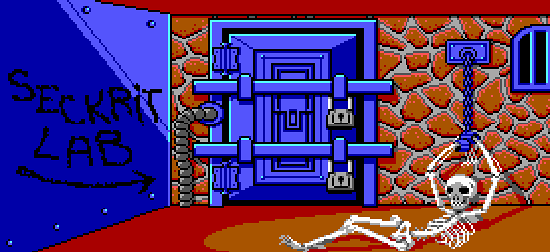
The Mansion – Technical Aspects
If you love the old Lucasfilm games and want a peek into how their venerable game engine worked from a very technical perspective, you should read this article that walks through a disassembled Maniac Mansion. Extra bonus: Ron Gilbert, the creator of the SCUMM scripting language, drops a lengthy note in the comments section with insider info:
One of the goals I had for the SCUMM system was that non-programers could use it. I wanted SCUMM scripts to look more like movies scripts, so the language got a little too wordy. This goal was never really reached, you always needed to be a programmer. 🙁
Some examples:
actor sandy walk-to 67,8
This is the command that walked an actor to a spot.
actor sandy face-right
actor sandy do-animation reach
walk-actor razor to-object microwave-oven
start-script watch-edna
stop-script
stop-script watch-edna
say-line dave “Don’t be a tuna head.”
say-line selected-kid “I don’t want to use that right now.”I think it’s amazing that they managed to build a script interpreter with preemptive multitasking (game events could happen simultaneously, allowing for multiple ‘actors’ to occupy the same room, the clock in the hallway to function correctly, etc.), clever sprite and scrolling screen management, and fairly non-linear set of puzzles into software originally written for the 8-bit C64 and Apple II era of computers.
-
Monkey Island Boxing
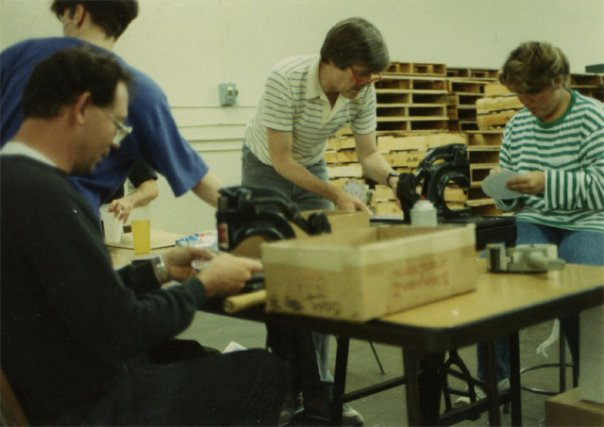
Know who assembled the retail boxes and whatnots for the original Secret of Monkey Island launch (including putting together the Dial-A-Pirate™ codewheels, as seen above)? The actual developers! I believe that’s Hal Barwood in the red glasses, and maybe that’s Dave Grossman on the left? If you have positive ID’s on anyone in the photo, let me know! The GameCola blog scored these photos of launch assembly from Tim Schafer’s Facebook page, including this good bit of trivia:
In one of these boxes, the developers slipped a five-dollar bill, signed by the whole team. It hasn’t been seen since.
The game industry’s definitely a bit different these days.
-
A Private School Principal Once Told Me That in
A private school principal once told me that in the history of literature, the greatest translation of all time was the English translation of Waiting for Godot, because Samuel Beckett had personally translated it from French, in which he’d originally written it, into English, his mother tongue. Well, Steve Purcell just might be the Samuel Beckett of comic book video games. From an article on Huffington Post declaring that Steve Purcell’s Sam & Max Hit the Road is among the greatest comic book games ever (hard to deny). Nothing revealing in the article, I just enjoy that one of my all-time favorite cartoonists is becoming well-known enough now after 20+ years to start making appearances on sites like HuffPo.
